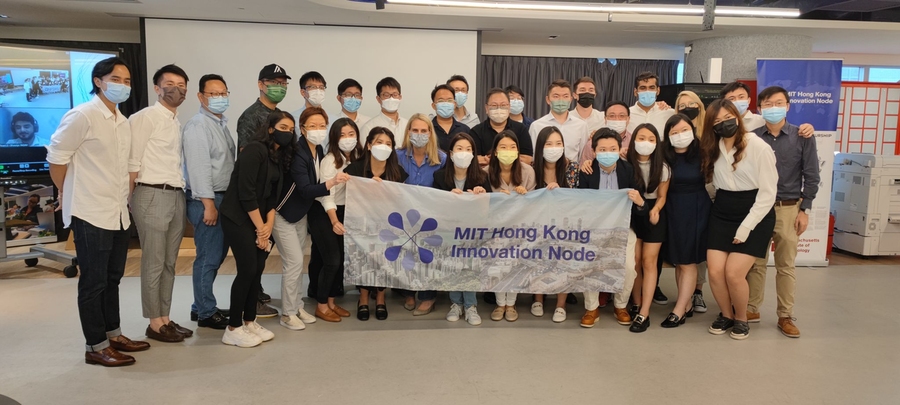MIT students collaborate with Hong Kong peers to propose fintech solutions during the MIT Entrepreneurship and Fintech Integrator.
MIT Hong Kong Innovation Node
The MIT Hong Kong Innovation Node recently hosted its annual fintech entrepreneurship program, called MIT Entrepreneurship and Fintech Integrator (MEFTI). Designed for student innovators from MIT and Hong Kong, the program offers a real-world lens into Asia’s burgeoning financial services sector. Program partners this year included the Hong Kong Monetary Authority, DBS Bank, and WeBank, where senior leaders provided insights into business needs, helping students connect theory into practice.
Due to Covid-19, MIT students participated remotely while Hong Kong students joined in-person at the Innovation Node. Coupled with the 10-day intensity typical of bootcamps, the hybrid learning environment demanded quick onboarding as a team and effective collaboration under the new normal.
“The learning curve wasn’t easy, but my teammates across Hong Kong, Europe, and the United States were very supportive and we managed to optimize our productivity across time zones,” says Andy Wong, an MIT student pursuing his MBA degree from the MIT Sloan School of Management.
A key feature of MEFTI is developing the critical problem-solving skills to tackle complex problems, from opportunity identification and evaluation to solutions ideation and pitching. This was supported through the disciplined entrepreneurship framework facilitated by staff from the Innovation Node.
Students are placed in interdisciplinary teams reflecting highly diverse skill sets and backgrounds, and build up an entrepreneurial spirit as they venture through the journey.
“What surprised me the most from MEFTI was the entrepreneurship spirit around me,” says Wong.
As digital opportunities to reach, engage, and retain customers become the linchpin to thrive in the increasingly competitive banking sector, companies seek new ways to innovate their services with technology and identify new pockets of growth.
Students gained direct exposure to industry experts across investment services, consumer lending, and open API. These connections provided a deep dive into the rapidly evolving consumer banking business and the local regulatory landscape. Expanding beyond geographic boundaries of Hong Kong, the program also engaged mentors and speakers from Thailand and United States.
“Being a part of a more significant impact, I really enjoyed mentoring for MEFTI,” says former MIT Sloan Fellow Sorakrit Phruthanontachai MBA ’20, who currently serves as a senior vice president at Bangkok Bank’s information technology division. In addition to being able to contribute back to the MIT community, he also “learned a lot from the student teams too, the passion that they have, and the technology that they propose to solve industry problems.”
Joining as a remote participant from Indonesia, MIT System Design and Management graduate student Zenia Adiwijaya says the program gave her a “thorough and extremely insightful overview of the financial industry in the Asia region.”
“It’s also a blessing to learn from Hong Kong students about the local market,” she adds. “Coming from an engineering and science background, I learned about the context and potential applications of technologies in the financial industry.”
The program culminated in a showcase orchestrated in hybrid format. Four teams pitched their solutions with a combination of in-person and online presence to a panel of judges represented by industry partners. The ideas included a financing solution for online gamers, an incentive-driven customer journey to reap benefits of open API, and a digital platform connecting customers to an online social community for equities trading.
Brit Blakeney, executive director of innovation and ecosystems at DBS Bank, commended the teams for tackling complex opportunity statements. “They were all amazing, really great ideas, and I think some of the business challenges that we gave you were really challenging as well.”
For Juni Yan, managing director of WeBank’s international fintech business, the students’ fresh perspectives made an impression. “I can visualize a lot of hard work, energy, days and nights that you put in there.” Yan added, “To be honest, very amazing presentations today, with lots of creativity and new ideas.”

